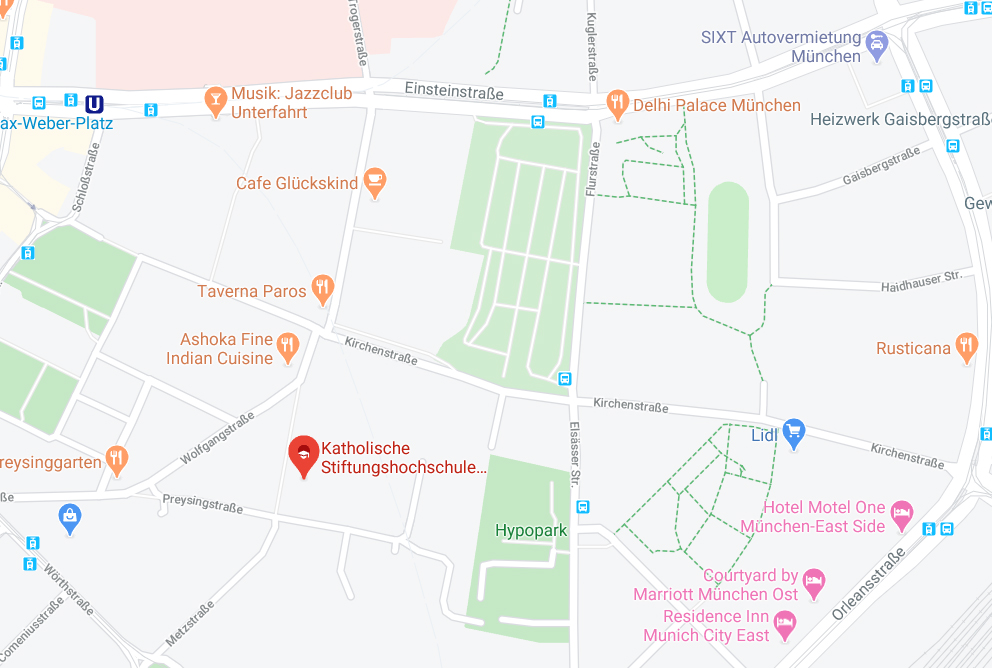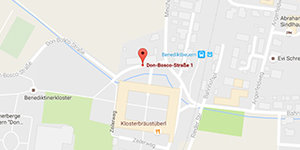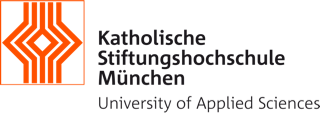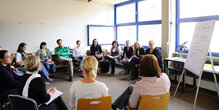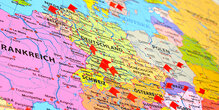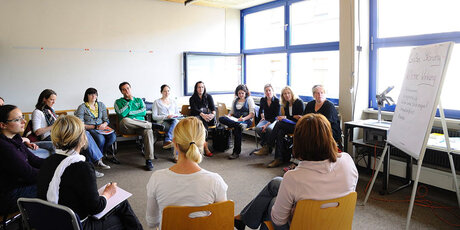Collaborative doctoral degrees at the KSH Munich
For a long time, it was only possible to study for doctoral degrees at universities. Universities of applied sciences prepared their graduates for professional vocations. The legal regulations were changed in 2012, since then doctoral degrees have also been offered at universities of applied sciences. This is on the proviso that these are “collaborative doctoral degrees”, i.e. a doctoral programme conducted jointly with a university.
There are currently three ways to obtain a doctoral degree at the KSH: one is through the REASON programme (collaborative partner LMU Munich), the second through the BayWiss collaboration project with the universities of Augsburg, Bamberg and Regensburg, and the third through the doctoral degree programme "Ethik, Kultur und Bildung für das 21. Jahrhundert" (ethics, culture and education for the 21st Century) run in cooperation with the Catholic University of Eichstätt-Ingolstadt and the Munich School of Philosophy. More information on the programmes can be found on the relevant pages below.
These also provide general information on funding opportunities and specific doctoral degree programmes in subjects offered at the KSH. If you have any queries, please e-mail the university’s doctoral degree officer at promotion@ksh-m.de.
REASON doctoral programme
It is possible to complete a doctoral degree at the KSH in cooperation with a university. Following intensive talks, the KSH now works together with Ludwig-Maximilians-Universität (LMU). The Munich Center of Learning Sciences (MCLS), which is affiliated with the LMU, has developed an international doctoral programme on scientific reasoning and argumentation (REASON). Its interdisciplinary approach covers various faculties and disciplines: medicine, didactics, psychology, biology, mathematics, computer science and social work/applied educational sciences.
This type of programme is the first of its kind to date to be offered at the KSH. It works by offering doctoral positions in a programme that is perfectly structured, supervised by professors from both universities, and has an international focus. The graduate programme involves joint colloquia, courses and stays abroad. It gives Master’s degree graduates at the KSH the opportunity to apply for a doctoral degree. Detailed information on the programme and application requirements.
Collaboration with BayWiss (Bavarian Academic Forum)
The KSH is part of the BayWISS collaborative doctoral panel “Sozialer Wandel” (social change) (University of Bamberg/Landshut University of Applied Sciences) and “Gesundheit” (healthcare) (University of Augsburg/Universität Regensburg). Both programmes offer students the chance to prepare a dissertation and obtain the title of Doctor. Students are supervised by lecturers from the KSH and the relevant partner university, working in close cooperation.
Doctoral degree programme “Ethik, Kultur und Bildung für das 21. Jahrhundert” (ethics, culture and education for the 21st century)
The doctoral degree programme is jointly sponsored by the KSH, the Munich School of Philosophy (HfPh) and the Catholic University of Eichstätt-Ingolstadt (KU) in cooperation with the Hanns Seidel Foundation. Doctoral candidates are supervised in tandem with professors from the participating universities. The Hanns Seidel Foundation provides the financial and intellectual support for ten doctoral scholarships to be awarded using funds granted by the Federal Ministry of Education and Research (BMBF) to the thirteen German Begabtenförderwerke (funding organisations for gifted individuals) for the purpose of promoting doctoral degrees.
The framework of the doctoral programme in terms of content is formed by the subjects of “(Trans)Kulturelle Bildung” ((trans)cultural education), “Globalisierung” (globalisation), “Befähigung und Care in sozialer Verantwortung” (enablement and care in social responsibility) as well as “Mensch und digitale Gesellschaft” (people and the digital society). The first group of students began work on their doctoral degrees in the 2018/19 winter semester. Alongside basic philosophical questions about the status of values, freedom of action and virtues, the nine current scholarship recipients are also looking into practical issues of application - for example, in relation to the challenges of automation and digitalisation, the use of new media in school education and nursing, as well as the social perception of care against the backdrop of dealing with illness and death. More information is available on the website of Katholische Hochschulen in Bayern (Catholic universities in Bavaria).
Doctoral colloquium on social work in Munich
Are you working on a doctoral degree in a subject from the field of social work – but in another (university) discipline? Are you looking for a place where you can exchange ideas with other doctoral researchers who have a background in social work and are also working on doctoral degrees in social work subjects? Are you looking to meet up in Munich, regardless of where you studied or where you are doing your doctoral degree?
The KSH Munich holds a regular doctoral colloquium for doctoral researchers who have a background in social work or are working on doctoral degrees in social work subjects, but (are having to) do this in another discipline, e.g. as a result of not being entitled to study for doctoral degrees at universities of applied sciences.
Funding opportunities
Doctoral degrees cost money. Here we present possible funding options as well as current tenders on the subject areas at the university. The 13 German Begabtenförderwerke (funding organisations for gifted individuals) award funding from the Federal Government and so cover a wide range of social groups in terms of content. More information on this is collated on StudiumPlus. Liason lecturers can also be contacted in advance on campus at the KSH. Links to current tenders can be found here.
Other doctoral programmes
Master’s degree graduates from the Faculty of Nursing can also complete a doctoral degree at the Institut für Didaktik und Ausbildungsforschung in der Medizin (Institute for Medical Education at the University Hospital, LMU Munich) and be awarded the doctoral title "rer. biol. hum.", though only a few places are awarded for this programme. Further information can be found on the institute’s website.
Collaborative doctoral degrees at the KSH Munich
For a long time, it was only possible to study for doctoral degrees at universities. Universities of applied sciences prepared their graduates for professional vocations. The legal regulations were changed in 2012, since then doctoral degrees have also been offered at universities of applied sciences. This is on the proviso that these are “collaborative doctoral degrees”, i.e. a doctoral programme conducted jointly with a university.
There are currently three ways to obtain a doctoral degree at the KSH: one is through the REASON programme (collaborative partner LMU Munich), the second through the BayWiss collaboration project with the universities of Augsburg, Bamberg and Regensburg, and the third through the doctoral degree programme "Ethik, Kultur und Bildung für das 21. Jahrhundert" (ethics, culture and education for the 21st Century) run in cooperation with the Catholic University of Eichstätt-Ingolstadt and the Munich School of Philosophy. More information on the programmes can be found on the relevant pages below.
These also provide general information on funding opportunities and specific doctoral degree programmes in subjects offered at the KSH. If you have any queries, please e-mail the university’s doctoral degree officer at promotion@ksh-m.de.
REASON doctoral programme
It is possible to complete a doctoral degree at the KSH in cooperation with a university. Following intensive talks, the KSH now works together with Ludwig-Maximilians-Universität (LMU). The Munich Center of Learning Sciences (MCLS), which is affiliated with the LMU, has developed an international doctoral programme on scientific reasoning and argumentation (REASON). Its interdisciplinary approach covers various faculties and disciplines: medicine, didactics, psychology, biology, mathematics, computer science and social work/applied educational sciences.
This type of programme is the first of its kind to date to be offered at the KSH. It works by offering doctoral positions in a programme that is perfectly structured, supervised by professors from both universities, and has an international focus. The graduate programme involves joint colloquia, courses and stays abroad. It gives Master’s degree graduates at the KSH the opportunity to apply for a doctoral degree. Detailed information on the programme and application requirements.
Collaboration with BayWiss (Bavarian Academic Forum)
The KSH is part of the BayWISS collaborative doctoral panel “Sozialer Wandel” (social change) (University of Bamberg/Landshut University of Applied Sciences) and “Gesundheit” (healthcare) (University of Augsburg/Universität Regensburg). Both programmes offer students the chance to prepare a dissertation and obtain the title of Doctor. Students are supervised by lecturers from the KSH and the relevant partner university, working in close cooperation.
Doctoral degree programme “Ethik, Kultur und Bildung für das 21. Jahrhundert” (ethics, culture and education for the 21st century)
The doctoral degree programme is jointly sponsored by the KSH, the Munich School of Philosophy (HfPh) and the Catholic University of Eichstätt-Ingolstadt (KU) in cooperation with the Hanns Seidel Foundation. Doctoral candidates are supervised in tandem with professors from the participating universities. The Hanns Seidel Foundation provides the financial and intellectual support for ten doctoral scholarships to be awarded using funds granted by the Federal Ministry of Education and Research (BMBF) to the thirteen German Begabtenförderwerke (funding organisations for gifted individuals) for the purpose of promoting doctoral degrees.
The framework of the doctoral programme in terms of content is formed by the subjects of “(Trans)Kulturelle Bildung” ((trans)cultural education), “Globalisierung” (globalisation), “Befähigung und Care in sozialer Verantwortung” (enablement and care in social responsibility) as well as “Mensch und digitale Gesellschaft” (people and the digital society). The first group of students began work on their doctoral degrees in the 2018/19 winter semester. Alongside basic philosophical questions about the status of values, freedom of action and virtues, the nine current scholarship recipients are also looking into practical issues of application - for example, in relation to the challenges of automation and digitalisation, the use of new media in school education and nursing, as well as the social perception of care against the backdrop of dealing with illness and death. More information is available on the website of Katholische Hochschulen in Bayern (Catholic universities in Bavaria).
Doctoral colloquium on social work in Munich
Are you working on a doctoral degree in a subject from the field of social work – but in another (university) discipline? Are you looking for a place where you can exchange ideas with other doctoral researchers who have a background in social work and are also working on doctoral degrees in social work subjects? Are you looking to meet up in Munich, regardless of where you studied or where you are doing your doctoral degree?
The KSH Munich holds a regular doctoral colloquium for doctoral researchers who have a background in social work or are working on doctoral degrees in social work subjects, but (are having to) do this in another discipline, e.g. as a result of not being entitled to study for doctoral degrees at universities of applied sciences.
Funding opportunities
Doctoral degrees cost money. Here we present possible funding options as well as current tenders on the subject areas at the university. The 13 German Begabtenförderwerke (funding organisations for gifted individuals) award funding from the Federal Government and so cover a wide range of social groups in terms of content. More information on this is collated on StudiumPlus. Liason lecturers can also be contacted in advance on campus at the KSH. Links to current tenders can be found here.
Other doctoral programmes
Master’s degree graduates from the Faculty of Nursing can also complete a doctoral degree at the Institut für Didaktik und Ausbildungsforschung in der Medizin (Institute for Medical Education at the University Hospital, LMU Munich) and be awarded the doctoral title "rer. biol. hum.", though only a few places are awarded for this programme. Further information can be found on the institute’s website.
